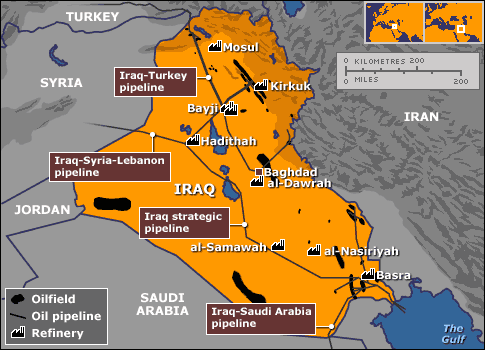Can Iraq Turmoil Lead to ‘Stagflation’?
< < Go Back
by Jon Markman,
The new unrest in Iraq has put into play the one thing that central bankers — who’ve been busily juicing the economy with cheap money stimulus — fear most: An energy-price-fueled spike in inflation.
The independent Sunni extremist militia known as the Islamic State in Iraq and the Levant, which now apparently controls Mosul and Kirkuk, is much more than just another terror cell; it has shown the capacity to capture and run Iraq’s energy infrastructure in the north, including refineries and pipelines, and to tax citizens and companies to pay for fighter salaries, provisions and weapons.
The organization also reportedly robbed the Bank of Mosul of $450 million, and now claims to be the richest independent militia in the world.
Fears that the group will impair oil exports through the southern port of Basra, which is in the heart of the Shiite homeland, have proven unfounded so far. Yet energy markets will demand a risk premium for crude oil until the Iraq government or its neighbors get the group under control.
Western equity investors care about this because a near trebling of crude oil prices between early 2007 and the middle of 2008 is now widely seen as one of the main catalysts that popped the housing bubble and threw the economy into recession. A similar, less dramatic situation played out during the Arab Spring uprisings of 2011, with crude oil prices rising 50 percent. That forced the Fed to slow its QE2 bond buying program, the predecessor to the one it is ending now. That capped stock market gains in 2011 as the promise of cheap money dried up.
It’s a big deal because higher energy prices are not only hitting consumers at an already vulnerable time when retail sales are slowing; they could force a quicker-than-expected short-term interest-rate hike. Central bankers are born to block inflation; it’s in their blood.
The result would be what economists call “stagflation” or the combination of economic stagnation and inflation. Japan is suffering a bout of this right now, which is why the Bank of Japan — the most aggressive major central bank in its cheap money injections — is whispering that it’s looking for the exit from its stimulus policies.
This was also the nightmare scenario the U.S. suffered through in the 1970s under Federal Reserve Chairman Arthur Burns. That was the last time the Fed pushed real interest rates down as far as we’ve seen them lately (as shown in the 60-year chart above). A series of oil price shocks in 1973 and 1979 unleashed double-digit inflation and growing unemployment amid the flood of money.
The 1979 crisis was connected to the Iranian revolution, the rise of an extreme Islamic militia within a major oil producing country powered by religious fervor, and a 4 percent drop in global oil supply. Replace Ayatollah Khomeini with Sunni extremist group leader Abu Bakr al-Baghdadi, and the setup is pretty similar.
The moral of the story: Cheap money stimulus is all fun and games until the Middle East blows up.
More From Money & Markets:




